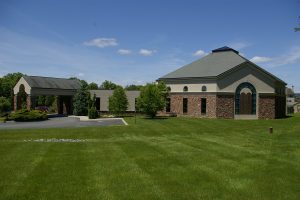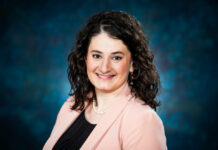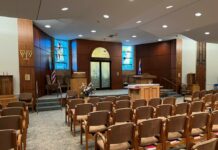
The Beth Israel Congregation of Chester County dates its history to a group of Jews that formed a community in Coatesville in 1904. Those founders chartered the synagogue 12 years later and named it Beth Israel. And in the 107 years since, thousands of people have walked through the doors, according to the history section on the shul’s website.
But whether this aging congregation will stand for another 107 years and welcome thousands of more people is an open question. So open that synagogue leaders acknowledge it on bethisraelpa.org. The vision section on the site is a little less confident than the history section.
It opens with this paragraph: “Today Judaism is facing a host of challenges and one of the profound challenges is that the synagogue is becoming less relevant in people’s lives, especially in younger generations. The greatest challenge that all synagogues are facing is how to reinvent themselves to maintain their relevancy. Our Beth Israel community is up to this challenge and will continue its rich legacy of looking forward.”
Beth Israel leaders are looking forward. They are just not sure yet what they see. All they know is how they want to approach the problem.
“Meet people where they are,” synagogue Co-President Cindy Blair-Miller said.
Blair-Miller’s fellow president, Andrew Weintraub, added that 15-20 years ago shul life was “religious-based.” Today though, the longtime member believes it is more “cultural-based.” So once a month, Beth Israel leaders and members plan a Shabbat dinner in addition to the usual Shabbat service. The evening is designed to “simulate if you were going to do Shabbat dinner at home,” Weintraub said, with prayers over Challah and other traditions. The shul plans similar gatherings around Passover and Chanukah. As Blair-Miller explains, “If you feed them, they will come.” And anywhere from 50-85 people show up for the Shabbat meals.
But it is not just the synagogue’s role that is changing, according to Blair-Miller and Weintraub. How leaders run the building is evolving as well. Like many shuls in the Philadelphia area, Beth Israel is trying to make it easier for millennials to pay for memberships. The Chester County synagogue offers congregant status at no fee to alums of its religious school. It also now has lower rates for single people and married couples in their 20s and early 30s.
“If you get people in the building and you build that Jewish connection, people will stay, and we find that funds come with that,” said Weintraub.

And these efforts are getting more people into the building. Blair-Miller estimates that the community has added eight to 10 young families over the past five years. The congregation consists of 119 households, which is up from 102 about a decade ago (though it has been as high as 175 within the past four decades).
At the same time, those are not massive increases, and the lack of young families is evident to Dominik Zebrowski, a 45-year-old member with his wife and five kids. The family moved to Chester County in 2017 and “felt very welcome” as soon as they walked into Beth Israel, he said. That feeling has not gone away, either. Zebrowski added that it’s not uncommon for 50, maybe even 70, members to plan an event themselves so they can “be together, talk and complain about Manischewitz wine.”
“And there’s always singing; there’s always good food. And people circulate throughout the room with eight-10 large tables set up,” he said.
But Zebrowski wants to see more outreach toward young Jewish families in the area. He thinks his contemporaries would enjoy and find meaning in “this warmth and great community” in the same way his family has over the last six years.
“It was and still is incredibly welcoming,” Zebrowski said.
Robin Kerollis-Napiecek has been a member for more than 40 years and speaks of a similar experience. She calls the synagogue her “family.” She said, “If anything were to happen, everyone comes to your aid.” And Kerollis-Napiecek appreciates that Beth Israel is so welcoming to interfaith families that her Greek-Orthodox husband, who belongs to a separate church, sings in the synagogue’s choir.
People will come to a place like this, according to the longtime congregant. They just need to know that it exists … and perhaps that it is willing to work with you on a payment plan.
“It’s about reaching people and making them feel like they are part of a community,” Kerollis-Napiecek said. ■






